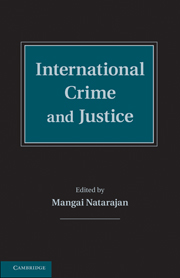Book contents
- Frontmatter
- Contents
- List of Figures
- List of Tables
- List of Contributors
- Foreword
- Preface
- Introduction
- Part I International Criminology
- Part II Law, Punishment, and Crime Control Philosophies of the World
- Part III Transnational Crime
- Part IV Organized Crime and Terrorism
- Part V International crime
- Part VI Delivering International Justice
- 44 The Role of the United Nations
- 45 Treaties and International Law
- 46 International Criminal Tribunals and Hybrid Courts
- 47 The International Criminal Court
- 48 The ICC and the Darfur Investigation
- 49 Victims’ Rights in the International Criminal Court (ICC)
- 50 Nongovernmental Organizations and International Criminal Justice
- 51 Global and Regional Human Rights Commissions
- 52 The Truth and Reconciliation Commission in South Africa
- 53 The Guatemalan Truth Commission
- Part VII International Cooperation and Criminal Justice
- Part VIII International Research and Crime Statistics
- Part IX International research resources
- World Map
- Index
- References
44 - The Role of the United Nations
Published online by Cambridge University Press: 05 October 2014
- Frontmatter
- Contents
- List of Figures
- List of Tables
- List of Contributors
- Foreword
- Preface
- Introduction
- Part I International Criminology
- Part II Law, Punishment, and Crime Control Philosophies of the World
- Part III Transnational Crime
- Part IV Organized Crime and Terrorism
- Part V International crime
- Part VI Delivering International Justice
- 44 The Role of the United Nations
- 45 Treaties and International Law
- 46 International Criminal Tribunals and Hybrid Courts
- 47 The International Criminal Court
- 48 The ICC and the Darfur Investigation
- 49 Victims’ Rights in the International Criminal Court (ICC)
- 50 Nongovernmental Organizations and International Criminal Justice
- 51 Global and Regional Human Rights Commissions
- 52 The Truth and Reconciliation Commission in South Africa
- 53 The Guatemalan Truth Commission
- Part VII International Cooperation and Criminal Justice
- Part VIII International Research and Crime Statistics
- Part IX International research resources
- World Map
- Index
- References
Summary
UN work in the area of International Crime and Justice is rooted in the UN Charter. In the preamble to that treaty, “we the peoples of the United Nations” are said to be “determined to save succeeding generations from the scourge of war, which twice in our lifetime has brought untold sorrow to mankind.” The Charter contemplates not only coercive power against aggressors but also efforts to build a just world to secure peace. Thus, Article 55 of the Charter exhorts the organization (especially through the General Assembly and the Economic and Social Council) to promote:
a. higher standards of living, full employment, and conditions of economic and social progress and development;
b. solutions of international economic, social, health, and related problems; and international cultural and educational cooperation; and
c. universal respect for and observance of, human rights and fundamental freedoms for all without distinction as to race, sex, language, or religion.
The UN has no standing body with criminal jurisdiction over particular crimes. Its court, the International Court of Justice, deals with states and international organizations, not individuals. Occasionally, on an ad hoc basis, the UN has taken on some features of a law enforcement agency, as in the Security Council’s creation of the International Tribunals for Former Yugoslavia and Rwanda. Those Tribunals are designed to enforce international law relating to genocide, crimes against humanity and war crimes against individual perpetrators in the particular instances of former Yugoslavia and Rwanda. But the Security Council chose not to create international tribunals for situations that were arguably as egregious. The UN was, however, involved in the creation of several “hybrid” courts, having a mixture of local and foreign judges. These were formed in, for example, Cambodia, Sierra Leone, Timor-Leste, and Lebanon.
- Type
- Chapter
- Information
- International Crime and Justice , pp. 337 - 342Publisher: Cambridge University PressPrint publication year: 2010
References
- 2
- Cited by



